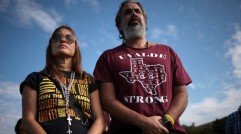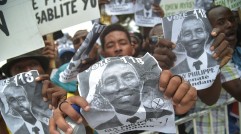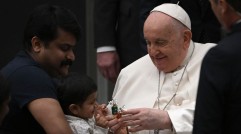Venezuela News 2014: Leopoldo López Finally Charged, Thousands Dress in Colors of National Flag to Protest
The crisis in Venezuela has taken a new turn, and it does not bring the struggle closer to an end. The new move by the government of President Maduro has angered the protestors. Yet, other developments concerning the South American nations, most importantly about food, have appeared in the last couple of days.
Late on Friday, Luisa Ortega Díaz, the Venezuelan Attorney General, announced that opposition leader Leopoldo López will be charged with inciting violence, arson, damage to property and conspiracy, according to Agence France-Presse. Blaming him for the protests encouraged even more protests in the Venezuelan capital.
López, leader of the Popular Will party, has been imprisoned at the Ramo Verde military prison since Feb. 18, and the government had until today to charge him with a crime. Following the announcement by the attorney general, around 3,000 protestors hit the streets demanding the opposition leader's release. Many of the protestors were students, and they were either wearing white, symbolizing peace, or the tricolor of the Venezuelan flag. They chanted, "Free Leopoldo."
The Venezuelan government responded with riot police and fired tear gas into the crowds. Yet, Venezuela may soon see a shortage in riot gear. According to CNN, the Spanish government has suspended the sale of police riot-control gear to Venezuela. The country's Economy Minister said Spain approved the sale of $3.5 million worth of riot gear to Venezuela last year, but the sale was suspended last month in a quiet agreement by a government commission that involved the Ministry of Defense, Foreign Affairs, Interior, and Commerce.
The commission routinely reviews the sale of such materials to foreign nations and takes into account "the internal stability of the nation destined" to receive the equipment, reports CNN. However, the internal stability of Venezuela may continue to elude its people and government. In attempts to remedy the food shortages, the Maduro government has introduced food ID cards aimed at preventing "over-buying," but it may also shed light on the worsening situation in the country, according to The Guardian.
The new cards restrict families to shopping once a week and were introduced by the government this week. Critics say it is an admission by the government that their economic policies have failed. Though the aim of the electronic card, reports The Guardian, is to keep records of hoarders and those who resell the foods for a profit, it also aims to curve the outflow of food into Colombia, where it is sold for ten times as much.
Subscribe to Latin Post!
Sign up for our free newsletter for the Latest coverage!














